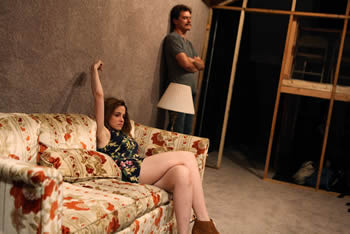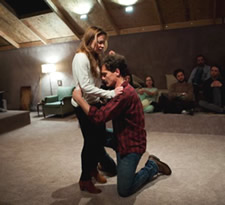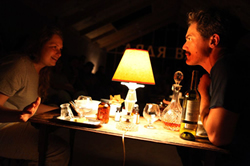
Creeps
By Jennifer Cayer
Uncle Vanya
By Anton Chekhov
A new version by Annie Baker
Soho Rep
46 Walker St.
Box office: (212) 352-3101
A padded room can mute the squawks of a
music lesson or the cries of someone out of control. At the transformed
Soho Rep it is the cozy retro atmosphere for Annie Baker's adaptation
of Uncle Vanya, a play much about misfires and frustrated
desires. Beige medium-pile carpet covers the floor, walls, and
wide risers where audience members sit cross-legged around three
sides of the central playing space. Enclosed within the unfinished
wooden beams of a house, bare skylight windows are cut out of
the steep eaves above, and giant backlit Cyrillic letters spell
"Vanya" along one wall. The set is at once a home abandoned mid-construction,
a musty vintage parlor, and self-conscious performance space.
It evokes the strange temporalities at work; we're not in 19th-century
Russia, nor are we in the contemporary U.S, but we're meant to
feel completely at home. Nestled into a theater-fort for grown-ups,
we rest back onto pillows and imagine helping ourselves to a cup
of tea from the samovar.
What is it about Vanya these days?
In April 2012 Target Margin's David Herskovits premiered his collaborative
postmodern take on the play and in July 2012 Andrew Upton's Sydney
Theatre Company production, starring Cate Blanchett, opens as
part of the Lincoln Center Festival. Baker's Vanya is
set in an attic, or the place where things that we no longer need
but can't imagine living without end up. Perhaps this is her view
of Chekhov's play. If so, Baker takes Vanya down from
the rafters, dusts it off, and aims to reintegrate it into our
living space. Baker's is not an updated Chekhov, but an attempt
to unearth, through the original grammar, cultural references,
and slang, a version that (as the prologue explains) "sounds to
our contemporary American ears the way the play sounded to Russian
ears during the play's first productions in the provinces in 1898."
The text adheres closely to Chekhov's original with several lines
that zing out, like Nanny's "we're all god's moochers" and Yelena's
theatrically self-conscious "I'm like a minor character in a play"
(another translation I consulted has "I'm a tiresome, inconsequential
person").
Part of the fun in Baker's reworked script,
Sam Gold's direction, and the impressive ensemble cast is that
while some lines feel like bold contemporary rewrites, we're also
reminded that Vanya does in fact tell Yelena that she has "mermaid
blood" flowing through her veins. Astrov's bleak refrain about
life as a long journey surrounded, in one translation, by "crackpots"
until you too become "odd," is re-translated by Baker and delivered
in a deadpan manner:
Yeah, and for what it is, life is pretty
boring and stupid. You're surrounded by creeps, you spend all
day hanging out with creeps, a few years go by and little by
little, without even realizing it, you become a creep yourself.
It's unavoidable.
As outmoded crackpots become contemporary
creeps, Baker revivifies Chekhov's language and her colloquial
version delightfully restores much of the humor that can become
obscured in headier translations.
 It's
no surprise that Baker was drawn to adapting Chekhov. Her award-winning
plays (Body Awareness, which premiered in 2008 at the
Atlantic Theater Company directed by Karen Kolhaas, Circle
Mirror Transformation directed by Sam Gold in 2009 at Playwrights
Horizons, and The Aliens directed by Gold in 2010 at
Rattlestick Playwrights Theater) share a Chekhovian attention
to minutiae and miscommunication. The plays, all set in the imagined
town of Shirley, loosely based on her hometown of Amherst, Massachusetts
and other small towns in Vermont, present scenes of country life
including intimate glimpses into the home of a university professor
and an adult community drama class. Both Baker and Chekhov demonstrate
a fascination with the limits of language and its simultaneous
capacity for cruelty and connection in everyday interactions.
It's
no surprise that Baker was drawn to adapting Chekhov. Her award-winning
plays (Body Awareness, which premiered in 2008 at the
Atlantic Theater Company directed by Karen Kolhaas, Circle
Mirror Transformation directed by Sam Gold in 2009 at Playwrights
Horizons, and The Aliens directed by Gold in 2010 at
Rattlestick Playwrights Theater) share a Chekhovian attention
to minutiae and miscommunication. The plays, all set in the imagined
town of Shirley, loosely based on her hometown of Amherst, Massachusetts
and other small towns in Vermont, present scenes of country life
including intimate glimpses into the home of a university professor
and an adult community drama class. Both Baker and Chekhov demonstrate
a fascination with the limits of language and its simultaneous
capacity for cruelty and connection in everyday interactions.
While Baker pokes gentle fun at the liberal-leaning,
small-farm friendly types who call the pastoral town home, her
plays are not satires, offering easy laughs at precisely rendered
types. Baker, like Chekhov, is preoccupied with our reliance on
others for self-recognition and the ways in which we can serve
as safe or dangerous witnesses for one another. Performances within
the performance, like Jasper and KJ's songs in The Aliens
or theater games in Circle Mirror often denote sudden
transformations, ratified by a benevolent onlooker. A few interludes
in Vanya are filled with woozy renditions of Russian
folk songs, and the professor's refusal to allow a momentarily
exuberant Yelena to play the piano resonates against the crucial
role of performance for Baker's characters. We wield tremendous
phenomenological power to positively mirror or distort one another's
existence to serve our own needs. Unlike Vanya's lament over the
professor's tyrannical hold on his life, Baker's characters often
manage to find glimpses of fulfillment as they see and feel themselves
through the eyes of others.
Vanya opens with one of Baker's
signature long silences. She insists that The Aliens
is nearly one-third silence and these protracted minutes offer
occasion to feel the texture of time and the resonating capacity
for change or inertia each of the characters possess. Nanny knits
and we hear Astrov biting his nails over the ambient chirping
of birds. For the audience, these silences also initiate a shifting
awareness from the show to the self-as-watcher. Sustained lapses
in dramatic action suture the temporality of the show to that
of the spectator. It helps, too, that the production lusciously
attends to the sensory space--the shared texture of the carpet,
tiny pastry crumbs falling from fingers to a plate, the crisp
bite of a pickle. With the production over two and a half hours,
Baker and Gold are less interested in satisfying a shortened theatrical
attention span than with re-creating the lethargy of a drawn out
summer day.
For those unaccustomed to sitting on the
floor for long periods of time, the discomfort can become distracting.
The in-the-round staging also offers its own obstacles and opportunities.
When Astrov shares his map of the district's shrinking forests
over time, commenting that he can tell by Yelena's face that she
has lost interest, one audience member complained in a too-loud
whisper, "I can't even see her face!" Conversely, Sonya and Yelena
quietly conspire, propped against one of the steps, heads reclining
right next to audience feet. The intimacy of the space and the
mini-arena staging are crucial to what Baker is up to. The staging
emphasizes the role of coincidence for some of our most intimate
connections, as well as the inevitable obstructions to fully recognizing
one another. As in Baker's other plays, loneliness and alienation
are based on fundamental misunderstandings, but so too are some
of our most personal connections.
Baker and Gold built their Vanya around
actor Reed Birney as the caustic and long-suffering titular character.
He dons New Balance sneakers and a knit sweater while Nanny fetches
shots of vodka in gray orthopedic shoes (Baker herself was the
costume designer). Ever-drab Sonya wears jeans and a plain loose
t-shirt while Yelena's repressed sexuality is aptly represented
by a push-up black bra visible beneath a sheer cream sweater.
Michael Shannon's Astrov, rumpled and world-weary from the outset,
speaks as if he's watching himself from a point in the future
with quizzical and effortful attention. The exchanges, especially
between Vanya and Yelena, sound like an old and familiar script,
a well-rehearsed and choreographed dance that has been performed
one too many times. Similarly, in Baker's original plays, pre-existing
scripts for human expression from songs, prayers, and stories
often serve as the available, and only, templates for action.
Transitory releases from well-worn and painful narratives are
found in the slight modifications that we're able to make in the
stories we repeat and tell about ourselves.
Vanya's characters, however, reckon
more with the pain of enduring a script they didn't write and
cannot change. Vanya, clutching a vial of morphine, can't imagine
how to continue living whereas Baker's drama instructor in Circle
Mirror invites the motley class to start again, and by the
end one character has imagined new and future lives for her and
the others. The magic of this production is the way in which it
plays up the scriptedness of the characters' lines and lives,
and the sense that these precise words have been and will be said
hundreds of times again without feeling stagnant. The eruptions
of Vanya's volatile breakdown, Yelena's flight, and Sonya's quiet
confession of love, emerge as all the more affecting. And, the
brief instances when characters break pattern are played up in
thrilling ways. Off the wagon and stumbling up into the attic,
Astrov rips his belt off and playfully whips Vanya before he collapses
in a drunken heap and removes his pants entirely. Sonya later
finds them and slowly reaches into each pant leg, pulling them
right side out in a sweet and subtly sexual act. Sonya and Yelena's
midnight reconciliation crackles with the energy of a teen slumber
party in which the liquor cabinet is raided as long-time grudges
subside and secret crushes are revealed.
Set and lighting designers Andrew Lieberman
and Mark Barton create a stunning visual after the upheavals of
the professor's intent to sell the estate, Vanya's misfired gunshots,
and Astrov's thwarted seduction. As the scene opens, an unprecedented
level of bright light pours down through the raw skylights, illuminating
the lighting grid like moonlit branches. Light in Chekhov's
Vanya radiates from within someone or offers the prospect
of safety and respite. Astrov asks:
You know when you're walking in the woods
on a dark night…and you see a light shining far off in the distance…and
you think to yourself: even though I'm tired and it's dark and
the branches are scratching my face…everything's gonna be okay…because
I have that light? And I'll get there eventually?
The appearance of light, for the first
time, from outside of the house presents a sign of such hope or
at least refuge against the dismal losses that conclude Vanya.
The majestic effect also suggests the beauty found in a uniquely
theatrical construction of nature. Unlike Astrov's romanticized
and diminishing forests, this moment is utterly contemporary in
its evocation of a necessary splendor found in an artificial proxy
for nature. We are no longer in a position to entertain the doctor's
binary of an authentic nature versus societal and industrial development.
Our current predicament is to recognize the corrosive, often invisible
effects of our developing and quickly discarded technologies on
the very notion of a pure or untainted nature. The fantasy, rendered
in Astrov's map of clearly delineated regions of natural land
and civilization, only fills our time, which will continue apace
until some imaginary border is finally encroached.
 The
show slowly recedes back into the night and the habitual rhythms
of Vanya, Nanny and Sonya's labors. Held together now by soft
lamplight, the three resume familiar positions as Sonya comforts
Vanya with the repeated promise of rest after he survives the
years between age 47 and death, the months between September and
winter, and the ruptures left by sudden departures. Baker's Vanya
is neither a reverent period piece nor a present-day variation.
We are situated comfortably among these characters, and yet uncomfortably
reminded that we have not become, as Astrov predicts, the "people
who look back and laugh…because we lived our lives so foolishly
and tastelessly. Maybe those people will have found a way to be
happy." We have not fulfilled such hopes for an accumulated wisdom
and over 100 years later we remain the same creeps obsessed with
personal gain, half-heartedly reckoning with environmental degradation,
devalued labor, and the day-to-day challenges of making sense
of our desires through the refracted lenses of others. In the
safety of the soft, cocoon-like attic, Baker brings us closer
to Chekhov's insomniacs, drunks, and self-pitying creeps so that
we may laugh with them, and at how far we've not yet come.
The
show slowly recedes back into the night and the habitual rhythms
of Vanya, Nanny and Sonya's labors. Held together now by soft
lamplight, the three resume familiar positions as Sonya comforts
Vanya with the repeated promise of rest after he survives the
years between age 47 and death, the months between September and
winter, and the ruptures left by sudden departures. Baker's Vanya
is neither a reverent period piece nor a present-day variation.
We are situated comfortably among these characters, and yet uncomfortably
reminded that we have not become, as Astrov predicts, the "people
who look back and laugh…because we lived our lives so foolishly
and tastelessly. Maybe those people will have found a way to be
happy." We have not fulfilled such hopes for an accumulated wisdom
and over 100 years later we remain the same creeps obsessed with
personal gain, half-heartedly reckoning with environmental degradation,
devalued labor, and the day-to-day challenges of making sense
of our desires through the refracted lenses of others. In the
safety of the soft, cocoon-like attic, Baker brings us closer
to Chekhov's insomniacs, drunks, and self-pitying creeps so that
we may laugh with them, and at how far we've not yet come.
